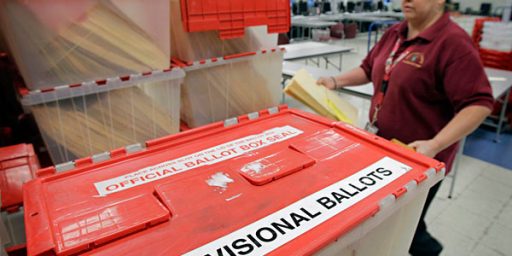No More Minnesotas
Patrick Ruffini is tired of seeing Democrats win close elections that were apparently won by Republicans on Election Day. He contends, “we are inviting a crisis of confidence in our election system if it looks like the winner is dependent on the time we count ballots: usually a Republican on the day of the election when standard procedures are followed, and then a Democrat after protracted recounts and court battles.”
Leaving aside the partisan aspect of this, he’s right about the “crisis of confidence in our election system” issue. Many Democrats think Florida’s Electoral votes–and hence the presidency–were stolen in 2000 and are dubious of Ohio’s vote in 2004, for example. So it cuts both ways.
Patrick’s proposed solutions are interesting, although I find some problematic.
Full electronic voting with a paper trail audit. There’s a reason Paul Carmouche didn’t challenge a 356-vote margin in LA-4: because the voting was 100% electronic. Critics have made good points about the lack of a paper trail on many of these machines. But MN-SEN shows that optical scan ballots, preferable only to hanging chads, are not fulproof. While plenty of bugs have been demonstrated on e-voting machines, there’s no evidence (to date) of actual votes being mis-counted or lost — and a paper trail should greatly improve the detection and resolution of these issues in real time.
Electronic voting is slow, confusing, and subject to theoretical mass manipulation. Mark-sense ballots are much more intuitive and have a built-in paper trail. The solution is simple, if draconian: No tolerance. Ballots that are incorrectly filled out are thrown out. Zero interpretation. If you vote in the wrong place, write in “Lizard People,” or otherwise don’t follow the ridiculously simple instructions, your ballot is excluded from the process. Period.
All ballots counted within 72 hours. It shouldn’t take weeks to count absentees and provisionals. Let’s set a reasonable window for counting every vote — like 72 or 96 hours — understanding that this might be different in states that are largely vote-by-mail.
I fully agree. This would require an earlier deadline for absentee voting but would be well worth it.
Zero tolerance for lost-and-found votes. Negligence in handling voted ballots should be made a misdemeanor offense at a minimum. Election officials should pay heavy fines and face removal for incidents like the 133 “lost” Minneapolis ballots. Heavy legal penalties should be a deterrent to “losing” ballots that are then “found” at conveninent points in a recount.
I agree in theory but think it impractical in reality. Most “election officials” are elderly volunteers doing the best they can with little training. You can’t punish people doing a thankless, complicated task out of a sense of civic duty because they’re not good at it. If we’re not going to have trained professionals doing the job — and we’re not; we vote too infrequently and have too many polling places — then we’re going to have to live with some degree of incompetence. All we can do, really, is make the process as simple as possible and remove as much human judgment as possible.
An open election results standard. I want this for other reasons, but a bunch of tech people should get together to formulate a standard for the reporting of real-time precinct election results in XML that also covers 1) reporting status of absentees and provisionals, and 2) historical precinct data, including notional numbers from census block counts for re-precincted areas. For all precincts, we should know how many voters are registered to get a real sense of voter turnout as well as how many people voted in this precinct in the last few elections. Practically, this means that the spotting of anomalies can be crowdsourced to the online community. If turnout seems abnormally high or low for a precinct, we can know in real time.
This sounds like a good idea but I don’t have the technical expertise to make a sound assessment.
Beyond the technical details, though, there’s something more fundamental at stake here: The elections in question are properly thought of as ties. No one truly knows whether Al Franken or Norm Coleman got more votes. Ditto Bush and Gore in Florida. Ditto Gregoire or Rossi in Washington’s 2004 governor’s race. We’ve all got our ideas which, not coincidentally, overlap with our preferences. But, in truth, margins of a couple hundred votes out of millions cast are irrelevant. Not only would a third and fourth count produce different results yet again but at some point it simply doesn’t matter from the standpoint of democratic theory.
If we’re truly concerned with making sure that the person who is slightly more preferred than another, then we’d be better off changing the election rules rather than trying to get better at counting the marginal vote. Why not have some sort of tie-breaker system for races where the margin is less than one percent?
In cases where a third party candidate gets a significant number of votes and no candidate gets a majority, instant run-off voting would be a solution. As would an actual run-off election. Or, perhaps, you could require a run-off (whether instant or actual) only in cases where the margin between the first two candidates is less than one percent (or two percent, or whatever), keeping it first past the post but considering elections within the margin to be ties.
In cases where only two candidates participated and the margin is negligible, it gets tougher. A re-vote may be the fairest solution but it’s not a perfect one; the dynamics change radically. It may be better to have a coin toss or a rock-paper-scissors tournament decide the thing. At least that way, the acknowledgment that the outcome was a tie would soothe the sense that someone was robbed.
UPDATE: I forgot one important reform: Non-partisan election officials. As noted above, the vast bulk of “election officials” are citizens, like our own Dave Schuler, who volunteer their time as a community service. There are, however, a handful of true officials — Secretary of State and county level election supervisors — who have official authority. These people should be nonpartisan and, preferably, trained civil servants rather than politicos. The mere fact that Kathleen Harris, Florida’s Secretary of State in 2000, was a Republican or that the Palm County supervisor was a Democrat skew the public perception of how they carried out their duties. Even unelected bureaucrats will have their preferences, of course; they’re only human. But sports referees don’t wear team logos even if they’re fans of a particular team. The result is that, when they make a bad call, we generally presume it’s either incompetence or judgment rather than foul play.
UPDATE (Dave Schuler): I want to second all of Patrick’s suggestions quoted above and underscore something that James alluded to. Elections are human actions and, consequently, there will always be errors. No election in which the margin of error is greater than the margin of victory will be deemed to be just. Under those circumstances no outcome is fairer than a coin toss. Regardless of the outcome elections deemed to be unjust undermine a representative democracy.
I think the solution is to recognize that all of these things are the case, accept them, and not perseverate on them.
Laws should be changed so that when three or more candidates are running and the election can’t be certified within 72 hours there should be a run-off. If there are only two candidates and the election can’t be certified within 72 hours they should just flip a coin as is the case in Minnesota if there’s a numeric tie.
At this point the senatorial election in Minnesota will never be deemed just as the presidential election in Florida in 2000 was not deemed just. In Minnesota there should have been provisions for a run-off just as there should have in Florida and there should have been provisions for dealing with the situation in which the margin of error was greater than the margin of victory.
Bottom line: we shouldn’t obsess over perfection in elections. We need means of dealing with their imperfections that are themselves determined through the processes of representative government.






Well I think the best solution is simply to not try to interpret votes. If a person was unable to fill out the ballot properly, then sadly their vote just isn’t going to count.
I also do not think found votes should be counted. I am not keen on the idea of charging or fining election officials, but if a bunch of ballots are found some place they shouldn’t have been, then I think you hold them to make sure numbers add up, or don’t count them at all, only because found ballots appear to look as if somebody went and filled out a bunch of ballots in a back room to change the results.
I actually think a run off election-even where there are only two candidates might be better than a recount. I think at the very least the candidate that gets their voters out in the greatest numbers the second go around deserves the win. Don’t think this would work in presidential elections, but the reality is that the close ones where only a few hundred votes separate the winner from the loser are state/local elections.
But I don’t trust the recount systems, because it isn’t just the court battles, but the appearance that one side is gaming the other to get a win for their guy, and when the process or elected offices in charge of it are controlled by one party and the candidate from their party lost on election day, but then comes back to win after the recount it smells.
Regardless of the method used to cast the votes, what always worries me is seeing the same precincts and/or counties always showing up hours after all the rest of a state is done and having ‘just the right numbers’ to carry the election at hand.
LBJ used to be a master of this in south Texas.
One good example in this election is the Chicago results.
Chicago had major new voter registration for the general election but despite that the voter turnout in heavy Black precincts and wards was down not up.
Bush won about 18% of the vote but McCain turned out a little over 13%.
I captured the data before the final results of provisional votes and such were done ,but the bulk of the votes are accounted for.
In past elections there were pretty much block voting of low 90 percent in the major Black wards , but this time they were hitting over 99% in many.
There were even entire wards of over 50 precincts where McCain did not break into double digit votes for the entire ward!!! Does any one think that is realistic?
Places where Bush got 10% of the vote McCain got less than 1%..
You can see the data with a couple of online spread sheets and compare it for verification with the official Chicago Election site.
What the results show totally defies logic and historic voting patterns.
There were even wards where Obama won multiple precincts with 100% of the vote. McCain and third party candidates got no votes at all.
First Half of Data
Second Half of Data
Scroll through the data and see if you can believe this fairy tale come true.
Here in Minnesota they are talking about what it would take to insert a run-off law in this type of situation. I believe it’s a good idea to get those close elections resolved by a run off as opposed to these recounts.
The whole process smells, and we now have a lot of sympathy for the crap Florida went thru in 2000.
I would have to find it again but there were even YouTube videos made during the election process that showed certified election observers being turned away from polling places despite having full identification and the authorization paperwork for their job to be accomplished.
The historic comparisons not done with these spreadsheets tells the real story and I will have to put them up later.
But when major Black wards (not 100% Black obviously since no ward is pure Black,even in Chicago) have more voter registration but fewer voters turning out both by number and percentage than prior election cycles , the only logical conclusion is that only one class of voter was allowed to participate in the polling and others were likely suppressed.
Either it was done at the polling spots or it was done simply by putting word on the street that if you were not going to vote for Obama it might be in your best interest to find other activities to fill your time that day.
Just Me has it right. The intent of the voter should not matter. There should be a statutory definition of what counts as a vote – any anything else is a spoiled ballot, no matter how clear the intent. That would at least remove all discretion from election officials in counting or recounting.
Awwwww, poor Patrick. He has to have his feelings hurt by some random Senator winning when he got eight years of a president via comparable circumstances.*
*Vastly shadier, actually, but who’s counting?
Something I would like to see is that the ballot be split.
There should be a federal ballot and a state ballot.
Too many times a ballot is rejected because of some error made on internal state issues such as a vote about a bond issue or a judgeship or whatever and the vote for the federal office gets tossed on this minor thing since the entire ballot is tossed.
Federal ballots should require photo id and proof of voter registration no matter if the state allows walk in voters from park bench registrations for their state stuff.
Residency requirements should be enforced uniformly for federal ballots across states.
I want to see a central voter registration data base that is used to validate current and new voters to ensure there are not multiple city/county/state votes by the same person.
Also it should be updated with data on deaths so that legacy voting is impossible.
If a person moves to a new state and registers to vote they should be required to disclose their prior state information. The central database should also be used to cancel out registrations from the state of residence prior to the move.
Fix the loopholes to make it one man, one vote and only one vote.
Ensure that a unique identifier is used for registration.
Eliminate the possibility of multiple votes under several prior marriage name variations.
Stop voting in one state in person and absentee voting in another.
The whole thing is not just about ensuring the integrity of the vote process, but to prevent the doubts of the system to cause people to sit out the vote process because of faults in the system.
Votes should be inventoried and packaged up by the judges at the precinct and put into standardized boxes for transit.
Ideally machine counts should be transmitted from the polls sites via encrypted methods (VPNs would be nice) that require password entry or keys from parties to authorize the transfer.
Vote memory cards and physical ballots should all be securely transported with multiple representatives present. If a stop is needed en route that requires one of the members to stop for a call of nature the voter storage box should be witnessed by a member of the public as to have not been tampered with if the transport people were of different gender and the container was not in full 100% absolute control.
ID of the witness should be logged for trace purposes.
The only state right now that seems to get it right is Virginia..once the polls close the counts flow into a computer link to build the vote unofficial results in very short time.
Even if they go county then state it sure happens within a much quicker time span than other states tend to achieve.
I think splitting the federal and local elections might be a good idea-not necessarily the days, but the ballots themselves. I also wonder if having a separate ballot for initiatives wouldn’t make more sense. I live in a state that doesn’t do very many ballot initiatives-I think I have maybe voted on two or three in 7 years, but there are some states that have tons of them each election.
Also, I do think there should always be a paper trail for any type of voting, but I also think we need to come to the realization that no voting process is without error, and there are going to be errors-either from the voter or from whatever method is used to count the votes.
I am just opposed to ballot interpretation. If the intent isn’t clear, then I think the voter gives up the right to have their vote counted. My precinct used pencil and paper until this year and now they use optical scan. The directions for how to fill out the ballot are pretty clear, and there are poll workers in place for a reason, if a person can’t understand them.
Sure “Observer”, and while you’re at it why don’t we install armed military guards at all doors and anyone caught butting in line, getting out of hand, be shot on sight?
That would certainly fix those pesky renegade voters.
That doesn’t work, it only moves the boundary. Imagine a tiebreaker, let’s say the non-incumbent party wins a tie. Well now it’s a race for the incumbent to win by a full one percent.
Except, as explained when you last brought it up, instant runoff voting has serious issues such as being non-monotonic that make it a poor choice as a voting algorithm.
More generally, thanks to Arrow’s Impossibility Theorem, it’s easy to show that no method of voting is going to always work right in elections with more than two candidates. And those conditions where they break tend to be close elections.
Why is it always the Democrats who must turn to lawsuits to win elections. Gore was ready to concede but decided to sue. By any legitimate count he lost the election. The US Supreme Court stopped the recount when it was shown different standards were being used to decide votes. I agree with the the previous poster. Count the correct ballots. Intent is not relivant. If you cannot understand how to vote you should not vote. Voting is a right but it does carry responsbility. Execise it.
What is odd to me is that I can’t think of any elections where the republican lost a close election and ended up winning, but we have several where the democrat lost but ended up winning and looks like we are about to have another.
There is something broken, and I can’t help but think somebody makes this happen unethically. At the very least if it is legitimate it says something about the ability of democratic voters to cast about a ballot.
If an election is close, your vote is not likely to matter because the election will be decided by courts and/or election boards.
If an election is not close, your vote is not likely to matter because of the large margin of victory.
What a great system.